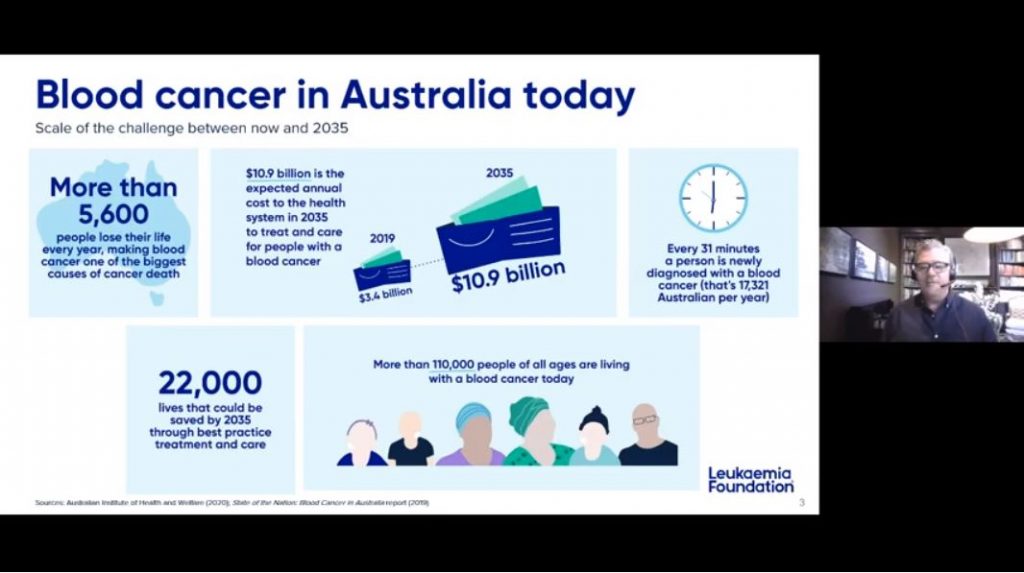
Leukaemia Foundation accelerates digital modernisation, ensures quality care
With more than 150 sub-types, blood cancer is the second most diagnosed cancer in Australia and the second most common cause of cancer-related deaths with more than 110,000 Australians living with blood cancer or a related blood disorder.
The Leukaemia Foundation is attacking every blood cancer, from every direction in every way they can by providing Australians and their families access to the trusted information, best-practice treatment and essential care they need.
Digital and data are key allies.

Following the merger of state organisations to create the national Leukaemia Foundation of Australia, the organisation has been undertaking a digital modernisation to streamline access to data, improve its accuracy and timeliness, and harness intelligent digital platforms to enable its team of around 180 people to deliver optimum support for people living with blood cancer.
Rod Broadhurst is Head of ICT for the Leukaemia Foundation and has accelerated the transformation to enable the organisation’s blood cancer support coordinators to continue delivering vital supportive care despite COVID-19’s impact on their face-to-face service.
The Leukaemia Foundation has deployed Microsoft 365, leverages SharePoint, Microsoft Teams and Yammer, and has rolled out Microsoft 365 Defender for additional security. What was initially envisaged as a 12-18 month program of work was telescoped into just six months.
The modernisation was crucial says Broadhurst as;
Without the introduction of Microsoft 365 the charity would have severely suffered in being able to continue to deliver services to those people living with blood cancer and their families. With the infrastructure already in place we were able to shift staff from working in the office to working from home with no disruption to service delivery as our staff were already sufficiently skilled up.
Broadhurst explains; “We were utilising outdated infrastructure that was costly and due to the replication of data in each State – emails of documents being sent from State to State and replicating on each State based server – the growing costs to maintain these was becoming troublesome.
“With Microsoft SharePoint and Teams rolled out we have been able to collaborate on the same documents at the same time in the one space and with Teams, staff could communicate via video and work through what they needed to do live. The time and effort saved alone was worth every cent,” he adds.
About three out of four of the organisation’s applications has now been modernised, with the majority now hosted in the cloud. And there’s more to follow. With Broadhurst favouring a a hybrid architecture through Azure Active Directory for identity management control of system and data access with Azure Sentinel to further improve the organisation’s security posture. It already uses Intune for endpoint management and Defender.
“With the use of Intune and Defender we felt comfortable in staff taking home their work PC or laptop and being able to safely work from their home environment. We took an attitude of ‘work from anywhere, anytime’ in 2019 and with the help of Microsoft 365 services and support we were able to have ourselves in a position that was well ahead of other businesses, and especially not for profits during the pandemic.
For us the ability for our Blood Cancer Support Coordinators to literally pick up their PC and go home and still continue to deliver a service for people living with blood cancer was absolutely brilliant.” Further to this, Microsoft 365 supports the practice outside of COVID-19 where Blood Cancer Support Coordinators travel to hospitals and regions and they can access organisation resources regardless of the “office” of the day.
The COVID-19 pandemic and the resulting change in the needs of people living with blood cancer, propelled the development of online support groups launched in April 2020 and with the staff already being skilled in theuse of Microsoft 365 products, this allowed for the quick pivot of support services including introducing individual and group support sessions via Microsoft Teams”
Broadhurst is now turning his attention to how it will be possible to leverage Azure to create a rich data collection for the Leukaemia Foundation, consolidating information from different systems to build a single source of truth that can accelerate both reporting and investigation.
He says that improved access to data should reveal the quality of life of patients with particular blood cancers and a better understanding of blood cancer survivorship. Quality of life of blood cancer patients will vary according to the way they have been living and feeling, and then armed with that insight the Leukaemia Foundation can start to develop optimised wellness plans for people to use post-treatment.
















